
Opinions
17:15, 27-Oct-2018
Opinion: Why is 8th Beijing Xiangshan Forum important?
Updated
16:16, 30-Oct-2018
Ashok Sajjanhar
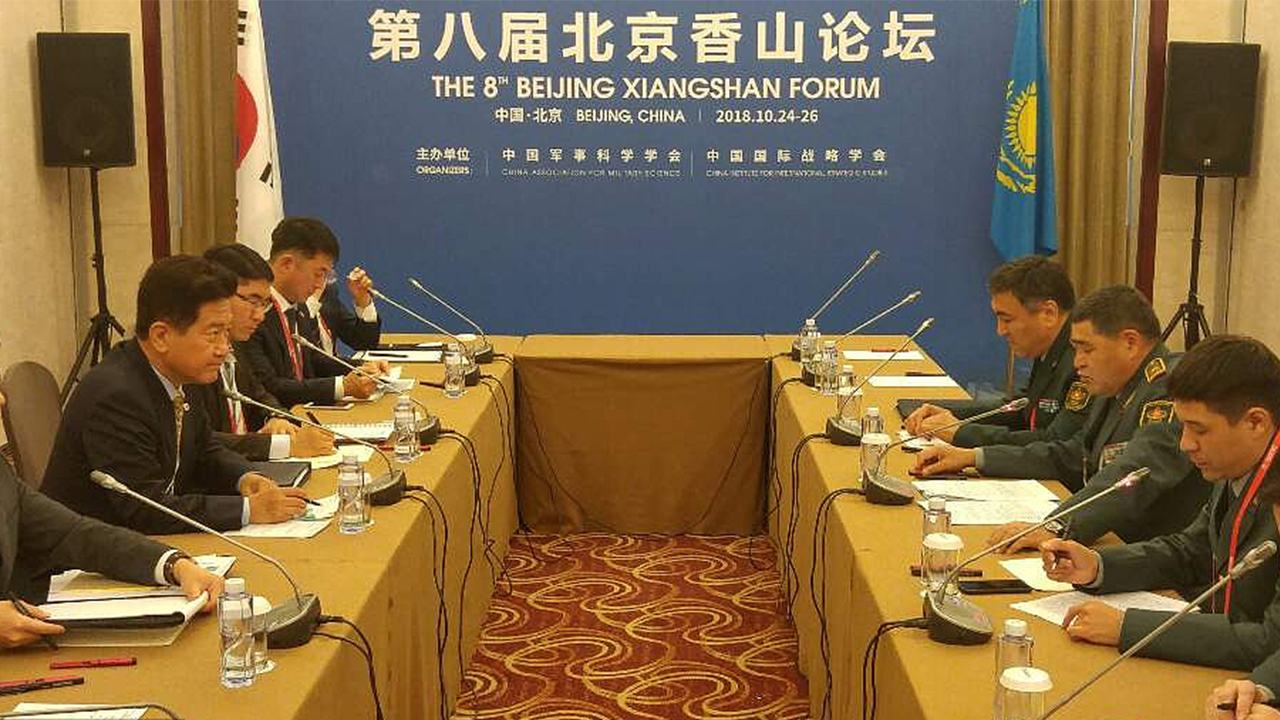
Editor's note: Ashok Sajjanhar is the president of the Institute of Global Studies in India, and former Indian ambassador to Kazakhstan, Sweden, and Latvia. The article reflects the author's views, and not necessarily those of CGTN.
The 8th Beijing Xiangshan Forum (BXF), held in Beijing on October 24-26, was different from its earlier editions for more reasons than one.
Not only was the conference saw a heavy presence of speakers and scholars, but more importantly, due to geopolitical circumstances under which it was held the discussions were more focused and apposite than the earlier meetings.
The last two years have been characterized by the highly disruptive influence of US President Donald Trump on a wide range of domestic and international issues.
Trump seems to have been driven by the passion to expunge all that his predecessor Barack Obama was able to achieve over his presidency spanning eight years.
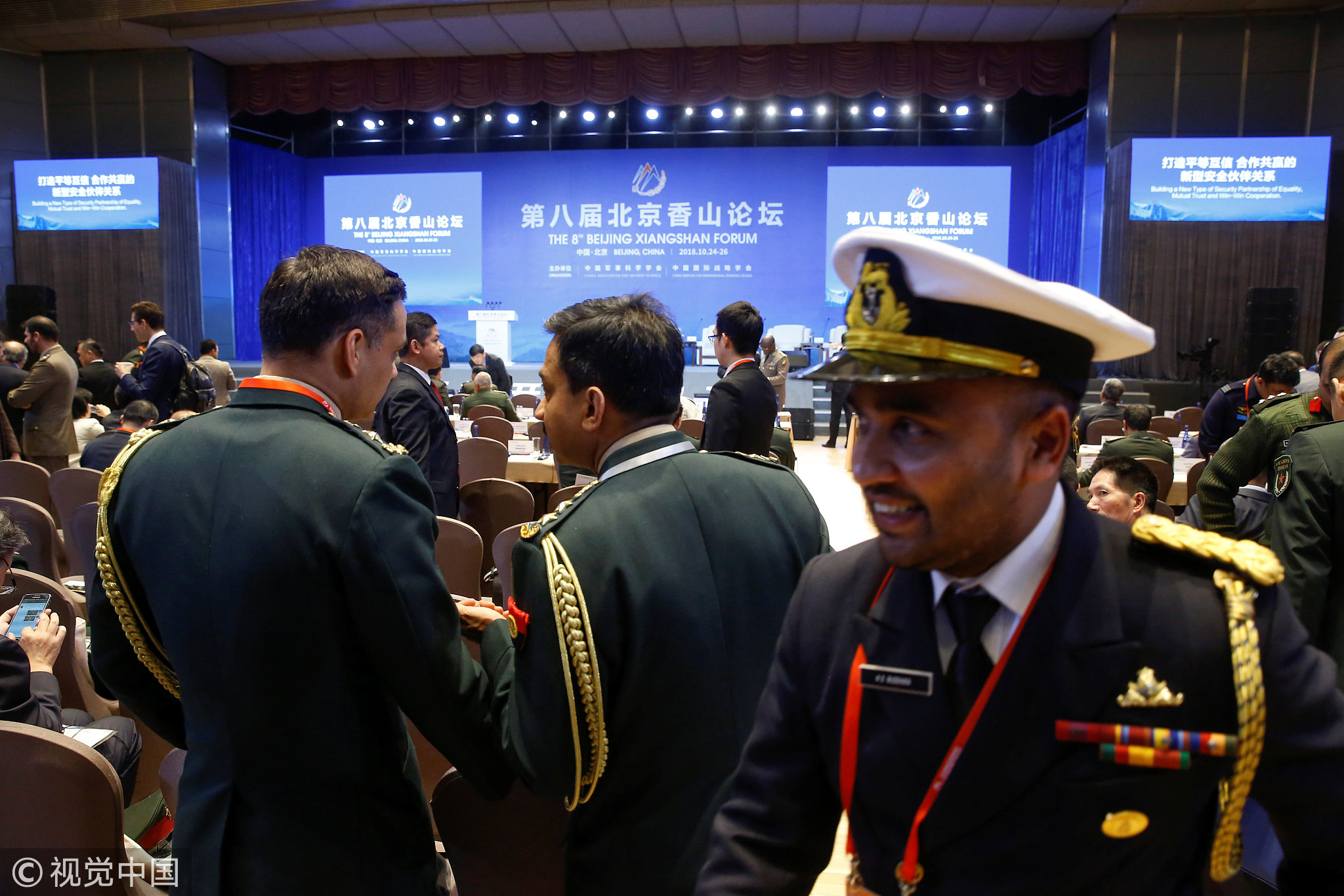
Military delegates at the 8th Beijing Xiangshan Forum in Beijing, China, October 25, 2018. / VCG Photo
Military delegates at the 8th Beijing Xiangshan Forum in Beijing, China, October 25, 2018. / VCG Photo
Trump did not limit himself merely to undoing some of the highly significant domestic policy decisions like the Affordable Care Act, known by its popular sobriquet Obamacare, but went further afield in the area of foreign policy by withdrawing from the Paris Climate Change Accord, renouncing the Trans-Pacific Partnership Agreement, jettisoning the Joint Comprehensive Plan of Action also known by its moniker the Iranian nuclear deal, and many more.
One of the most disruptive actions Trump has taken over his 22 months presidency is to brand China as a colossal threat to America's national security and well being.
This was first brought out comprehensively in the National Security Strategy released by Trump in December 2017 and more recently by the ominous statement by US Vice President Mike Pence at the Hudson Institute on October 4, 2018.
Pence accused China of "interfering in the domestic policy and politics of USA.'' He charged Beijing of "requiring many American businesses to hand over their trade secrets as the cost of doing business in China."
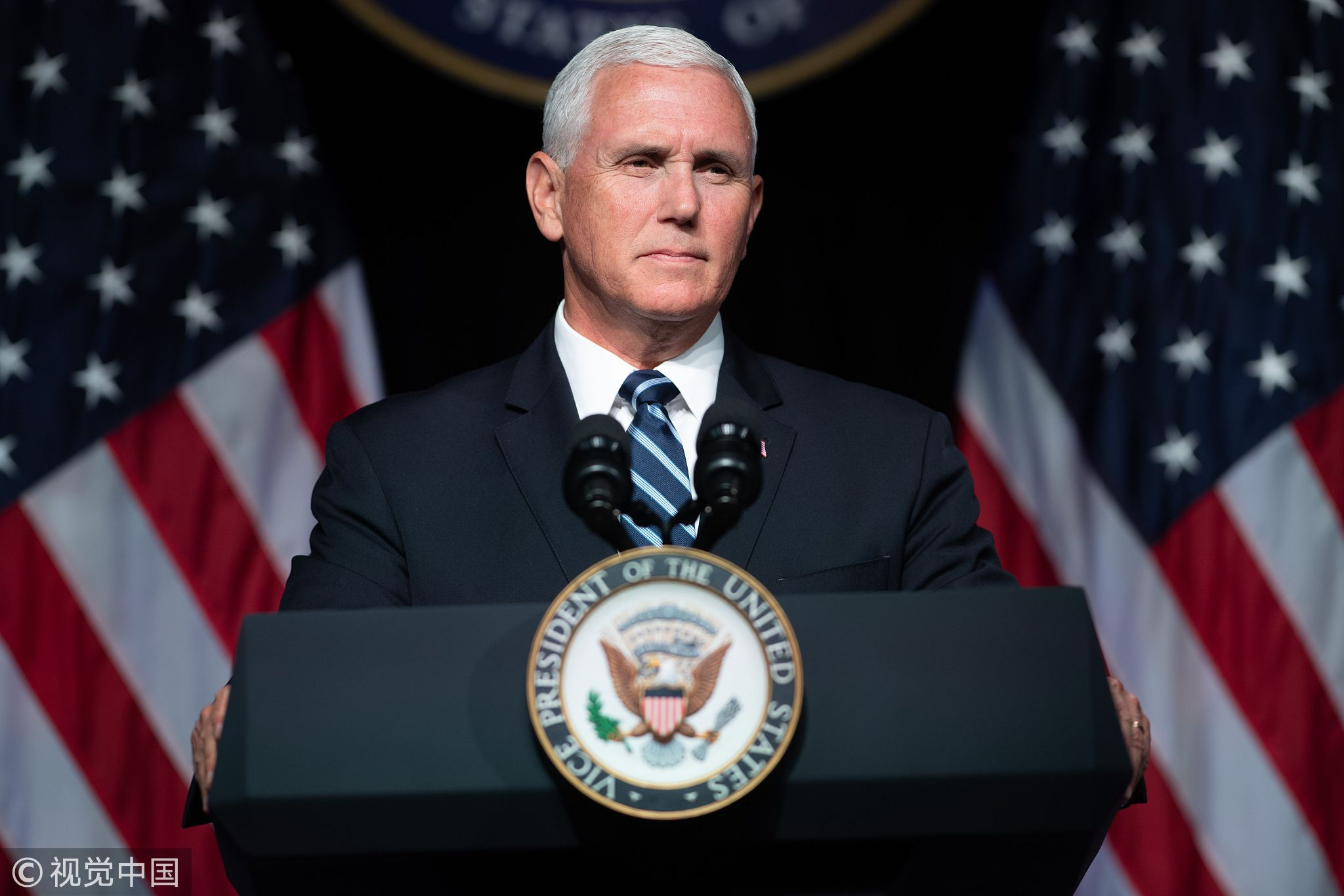
US Vice President Mike Pence during an event at the Pentagon in Washington, DC, August 9, 2018. / VCG Photo
US Vice President Mike Pence during an event at the Pentagon in Washington, DC, August 9, 2018. / VCG Photo
He warned that the US "will continue to take action until Beijing ends the theft of American intellectual property, and stops the predatory practice of forced technology transfer."
One will be making a colossal mistake if one were to think that these statements are a result of impulsive and Twitter-happy policy formulation that Trump is susceptible to.
On the contrary, these policy statements seem to have emanated after rigorous inter-Agency consultation and deliberations. The US has in recent months officially labeled China a "strategic competitor" and "revisionist power" trying to "shape a world antithetical to the US values and interests."
Trump's fulminations are directed not only against China but against other countries also including its allies and partners like the EU, Canada, Japan, the Republic of Korea (ROK), India etc. It is however indisputable that his tirades and actions against China are the most egregious and harsh.
It is in this context that the 8th BXF assumes greater relevance and significance. It provided a potent and influential platform to deliberate upon the disruptions and rapid transformations occurring all over the world and to evolve a common position to bring greater certainty and predictability as well as restore mutual confidence and trust in the conduct of international relations.
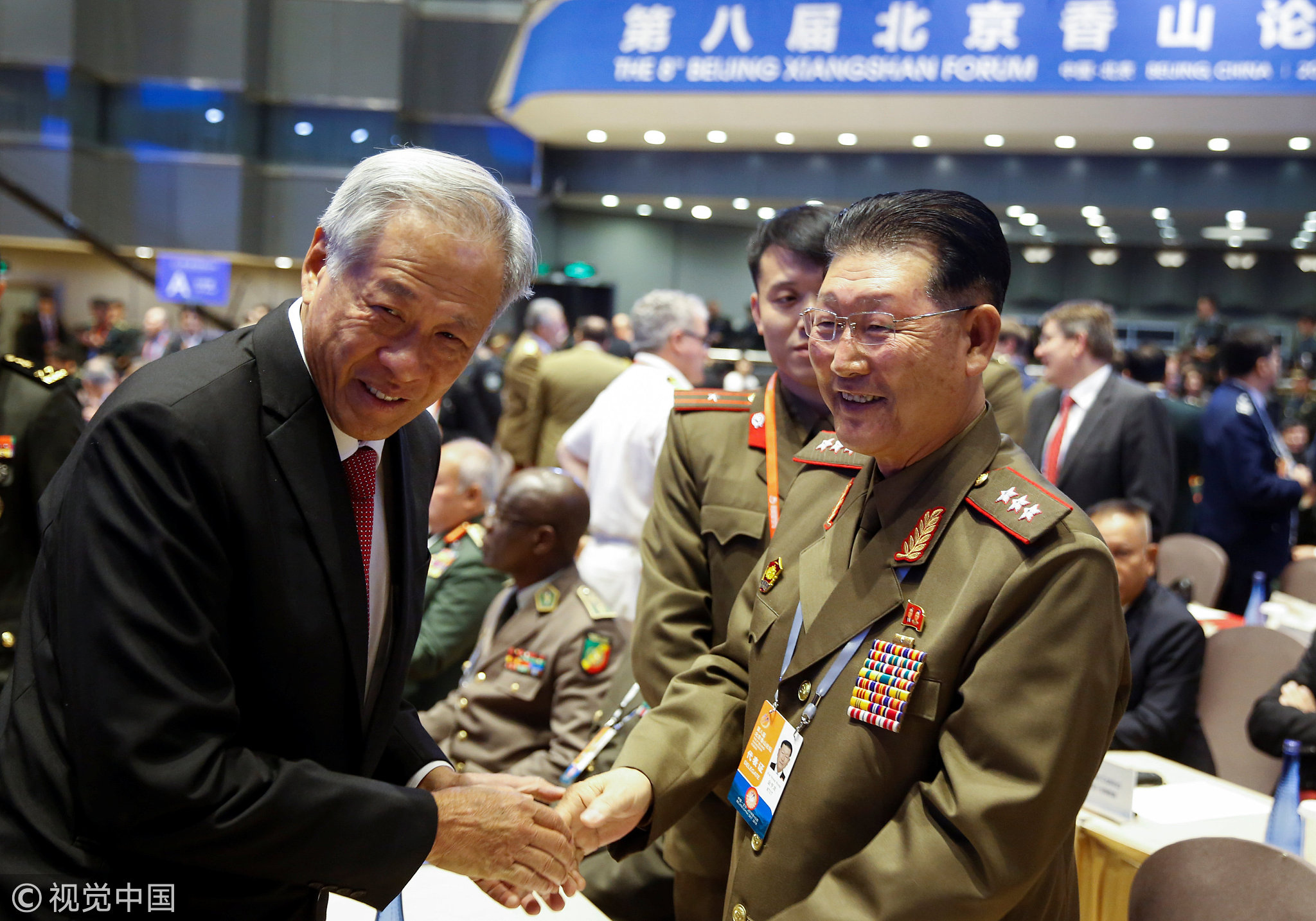
Singapore's Defense Minister Ng Eng Hen (L) shakes hands with DPRK's Vice Minister of the People's Armed Forces Kim Hyong Ryong (R) at the 8th Beijing Xiangshan Forum in Beijing, China, October 25, 2018. / VCG Photo
Singapore's Defense Minister Ng Eng Hen (L) shakes hands with DPRK's Vice Minister of the People's Armed Forces Kim Hyong Ryong (R) at the 8th Beijing Xiangshan Forum in Beijing, China, October 25, 2018. / VCG Photo
The Beijing Xiangshan Forum (BXF), which had been known as the Xiangshan Forum before, was initiated by the China Association of Military Science (CAMS) in 2006 as a track 2 platform for Asia-Pacific security dialogue.
It was upgraded as track 1.5 in the 5th Forum in 2014 and started to involve wider participation of defense and military leaders, heads of international organizations, former political personalities and retired generals, as well as renowned scholars from both in and out of the Asia-Pacific region.
Since 2015, the Forum has been co-hosted by CAMS and China Institute of International Strategic Studies (CIISS). It was renamed as Beijing Xiangshan Forum in 2018.
Over these years, BXF has evolved into a high-level security and defense forum in Asia-Pacific with significant international resonance.
More than 500 representatives from over 70 countries attended the 8th BXF. The forum's theme was "Building a New Type of Security Partnership of Equality, Mutual Trust and Win-Win Cooperation."
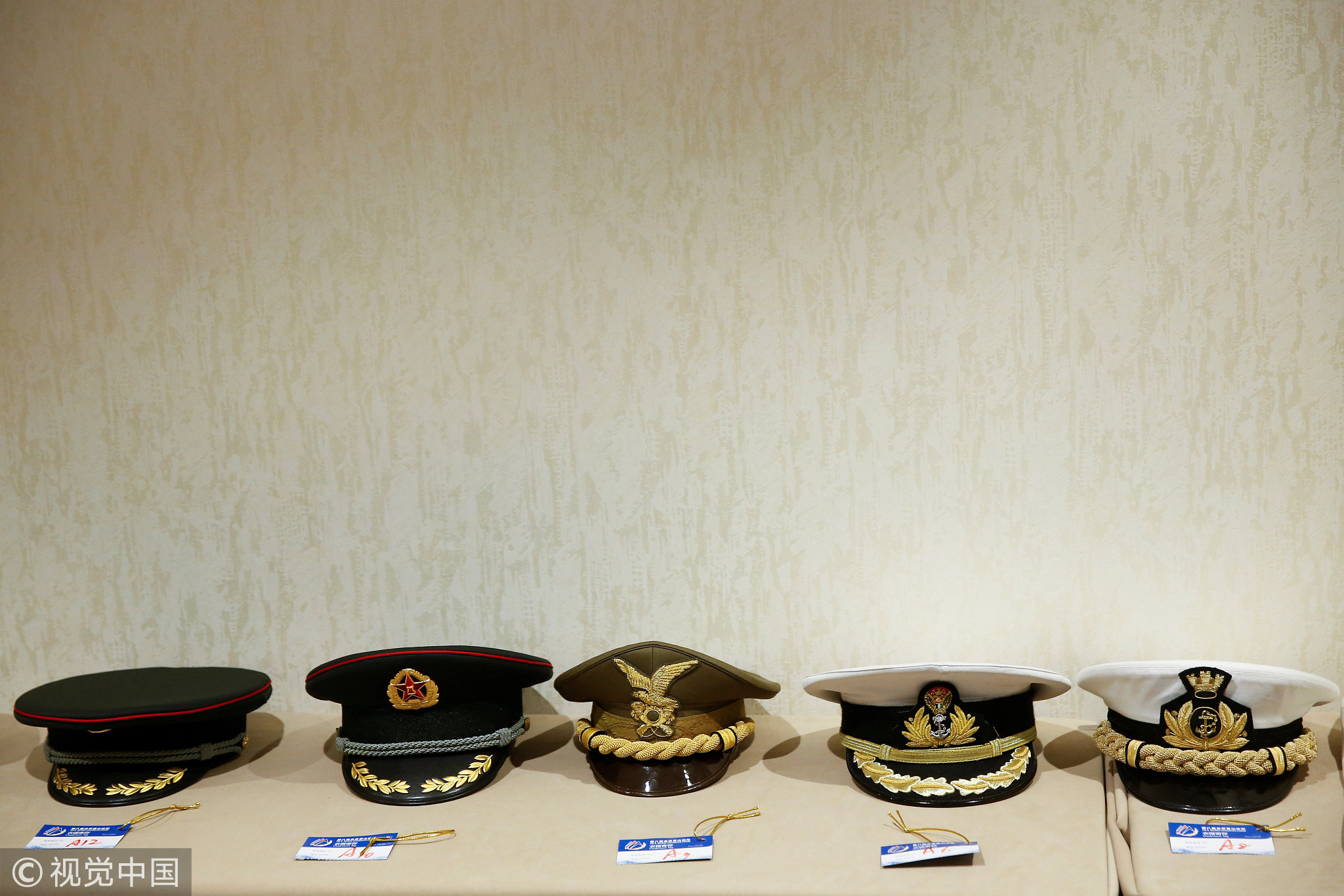
Hats of the military delegates from various attending countries are lined up in a cloakroom at the 8th Beijing Xiangshan Forum in Beijing, China, October 25, 2018. / VCG Photo
Hats of the military delegates from various attending countries are lined up in a cloakroom at the 8th Beijing Xiangshan Forum in Beijing, China, October 25, 2018. / VCG Photo
It included four plenary sessions focusing on new methods of international security governance, terrorism, maritime security cooperation, and challenges in the peacekeeping mission of the UN.
Special sessions were held concurrently on the situation in Northeast Asia, Middle East, Asia-Pacific and on Artificial Intelligence and Conduct of Warfare.
In his congratulatory letter, Chinese President Xi Jinping expressed China's willingness to increase strategic mutual trust and strengthen security cooperation with other countries and emphasized China's commitment to peaceful development and a shared future for mankind.
Exchanges under the aegis of BXF assume particular significance at a time when Trump administration is under severe domestic and international pressure because of its disconcerting and unsettling policy decisions as far as international relations are concerned.
The BXF can play a meaningful and vital role by producing ideas of reason, equity, and justice to promote peace, security, and prosperity in the world.
(If you want to contribute and have specific expertise, contact us at opinions@cgtn.com.)

SITEMAP
Copyright © 2018 CGTN. Beijing ICP prepared NO.16065310-3
Copyright © 2018 CGTN. Beijing ICP prepared NO.16065310-3